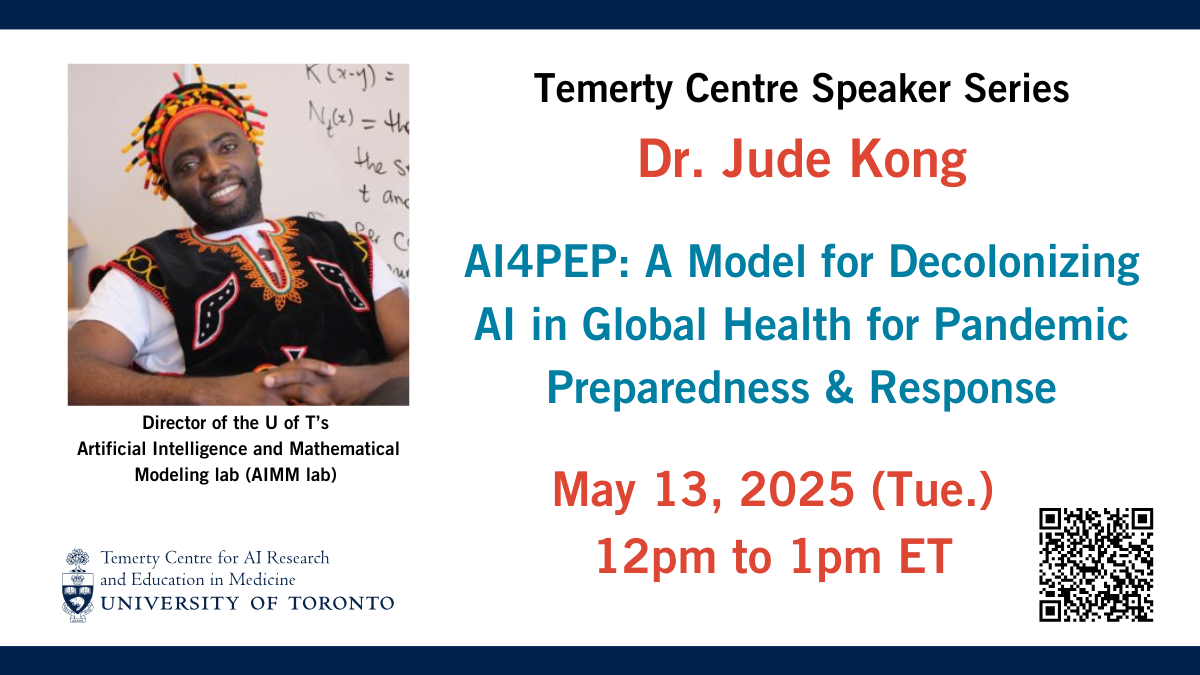Main Second Level Navigation
Temerty Centre Speaker Series: Dr. Jude Kong (May 13)
DATE: May 13, 2025 (Tue.)
TIME: 12pm to 1pm ET
PRESENTER: Dr. Jude Kong
TITLE OF TALK: AI4PEP: A Model for Decolonizing AI in Global Health for Pandemic Preparedness and Response
METHOD: Zoom
NOTE: This session is CPD-accredited for physicians.
Title of Talk
AI4PEP: A Model for Decolonizing AI in Global Health for Pandemic Preparedness and Response
Abstract
Disease outbreaks are increasing in both severity and frequency. Climate change is exacerbating existing health and social inequities by increasing the vulnerability of climate “hotspots” to the emergence and re-emergence of infectious diseases such as malaria, dengue fever, and Zika. Additionally, a growing number of these diseases are spreading from animals to humans due to factors such as increasing human encroachment into natural landscapes.
The One Health concept recognizes and responds to the reality that human health is interdependent with the health of animals and the environment. Addressing the complex nature of these interactions in a timely manner requires the ability to analyze large datasets across multiple sectors. Artificial intelligence (AI) solutions and data science approaches are increasingly being used globally to identify risks, conduct predictive modeling, and provide evidence-based recommendations for public health policy and action. However, there is a growing knowledge power imbalance between a few countries leading in AI and the rest of the world.
Researchers and innovators in low- and middle-income countries (LMICs) often lack the necessary training, high-quality datasets, and infrastructure to develop and apply algorithms based on their own contexts. Moreover, initiatives to address the complex nature of these interactions are often siloed, limiting their value for research and development due to a lack of scale and diversity. These challenges hinder inclusive and impactful AI research in health that provides global benefits. Since emerging and re-emerging disease outbreak challenges are global in scale, international communication and shared strategies, building on the expertise developed in varied contexts, are required to successfully address them.
To harness the power of AI in health, AI4PEP—a transdisciplinary, collaborative, multi-regional network—was established, focusing on bringing together the voices of different LMIC stakeholders from the outset. It aims to strengthen equitable and responsive public health systems by leveraging Southern-led, responsible AI solutions to improve prevention, preparedness, and response to emerging and re-emerging infectious disease outbreaks.
In this talk, I will present some of the AI solutions that we have co-created with communities and governments, which are currently being employed to strengthen healthcare systems in LMICs, as well as those we are actively co-creating and that will soon be ready for implementation. I will also discuss our trajectories for scaling these innovations.
Learning Objectives
By the end of this talk, participants will be able to:
• Describe the AI4PEP Network’s framework and strategy for decolonizing AI in global health to enhance pandemic and epidemic preparedness and response.
• Identify transformative AI solutions developed and deployed by AI4PEP to improve healthcare outcomes across the Global South.
• Recognize key emerging and weak signals likely to influence the trajectory of Digital One Health in the Global South over the next 5–15 years.
• Explain a systematic approach to embedding responsibility across the AI lifecycle—from data collection and algorithm development to deployment.
About the Speaker
Dr. Kong is a Canada Research Chair in Community-Oriented Artificial Intelligence (AI) & Mathematical Modelling of Infectious Disease. He is also a professor in the Dalla Lana School of Public Health cross-appointed to the Mathematics Department and Institute of Health Policy, Management and Evaluation, University of Toronto, where he serves as the director of the Artificial Intelligence and Mathematical Modeling lab (AIMM lab)( https://aimmlab.org/).
Additionally, he is the Director of the Africa-Canada Artificial Intelligence (AI) and Data Innovation Consortium (ACADIC) (https://acadic.org/) and the Global South Artificial Intelligence for Pandemic and Epidemic Preparedness and Response Network (AI4PEP) (https://ai4pep.org/). He is also the Regional Node Liaison to the steering committee of the Canadian Black Scientist Network (https://blackscientists.ca/).
He obtained his PhD in Mathematics with a certificate in Artificial Intelligence from the University of Alberta, his MSc in Mathematical Engineering/Ingegneria matematica from the University of L'Aquila, Italy and MSc. In Technomathematik/Industrial Mathematics from the University of Hamburg, Germany. His B.Sc. in Mathematics (major) and Computer Science (minor) was acquired at the University of Buea, Cameroon, and his BEd in Mathematics Education was earned at University of Yaounde I, Cameroon. He did a two-year postdoc at Princeton University.
Dr. Kong is an expert in AI, data science, mathematical modelling, and mathematics education. His principal research program focuses on developing and deploying innovative AI, mathematical, and data science methodologies and technologies for decision-makers in communities, public health, government, and industry, in order to provide important insights into local and global-scale socio-ecological challenges.
During the COVID-19 pandemic, Dr. Kong led a team of 52+ researchers across nine African countries, using AI to help contain and manage the virus. In 2022, he founded the AI4PEP network, overseeing 160+ researchers from 16 countries. The network focuses on leveraging Southern-led responsible AI solutions to enhance public health systems for better prevention, preparedness, and response to disease outbreaks.
Dr. Kong’s many research contributions and exceptional leadership have earned him several prestigious awards and recognitions. These include the York University (YU) Research Leader Award in 2020; recognition as one of Canada’s Innovation Research Leaders in 2021; recognition as a Black Hero of Operational Research by the Operational Research Society in 2021; recognition as a YU Community Change Maker in 2022; recognition from YU Magazine for enumerating positive change by inspiring Black students to aspire in 2022; nomination for the 2022 Postdoc Supervisor of the Year Award; 2022 Faculty of Science, YU Early Career Researcher Award; YU 2023 Research Leader Award and the 2023 YU President’s Emerging Research Leadership Award. He is an Editor for Data & Policy Journal; Royal Society Science; Scientific Reports, and Big Data and Information Analytics.

